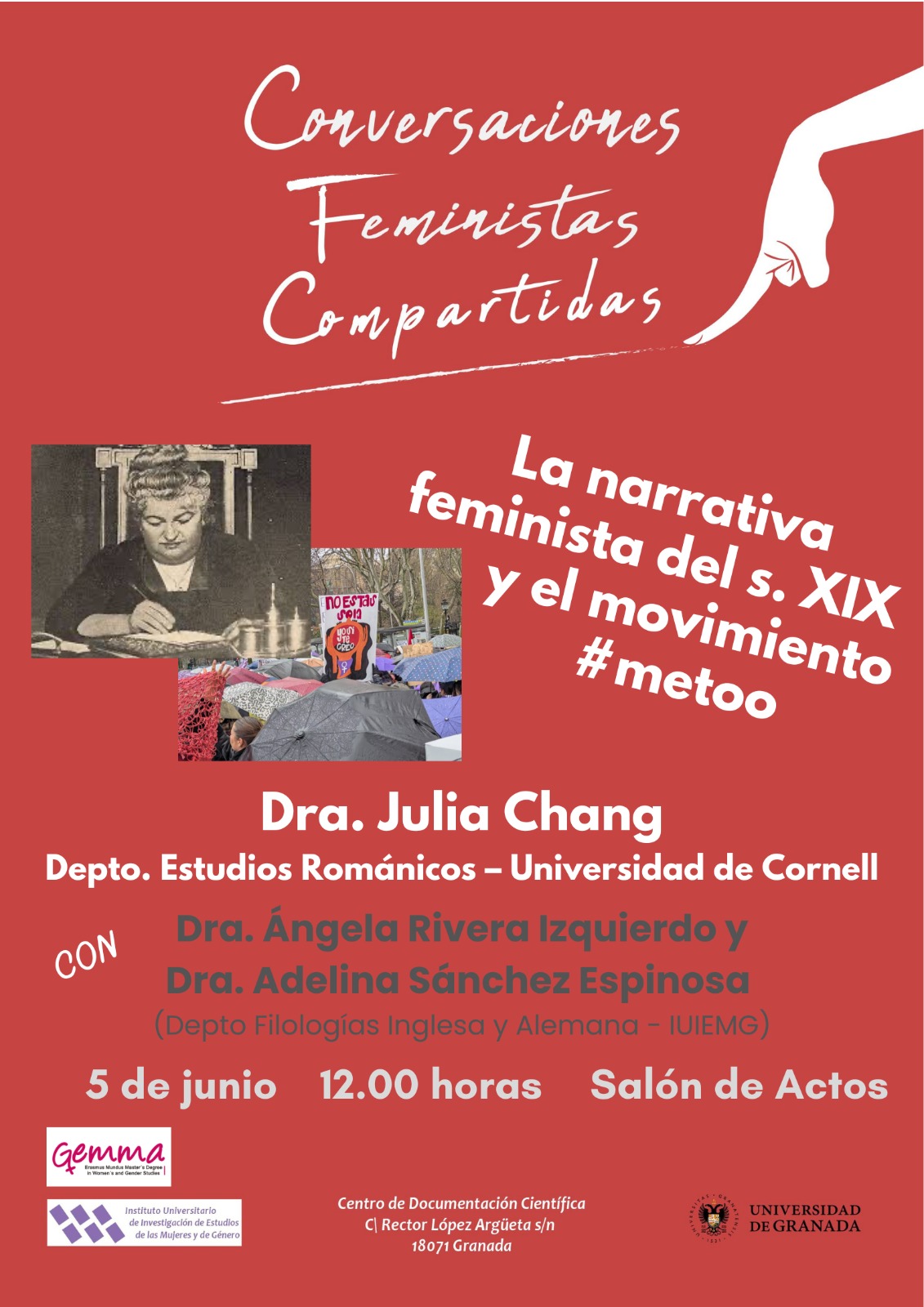September 2024
Induction Days
On September 23rd, 24th, and 25th, the Assembly Hall of the Scientific Documentation Center hosted the GEMMA student welcome sessions. During the first two days, the teaching team welcomed students from the 18th edition, who were beginning their first year, and those from the 17th edition, who were starting their mobility year in Granada. Additionally, the program and research lines were presented. Most of the courses were presented by the instructors themselves. The session on the 25th was divided into two micro-sessions: one for first-year students and another for second-year students. These were led by Omayra Herrero, Technical Coordinator of the GEMMA Consortium, and Samuel Rubio, Technical Coordinator of GEMMA Granada. In this session, doubts regarding administrative aspects were clarified.
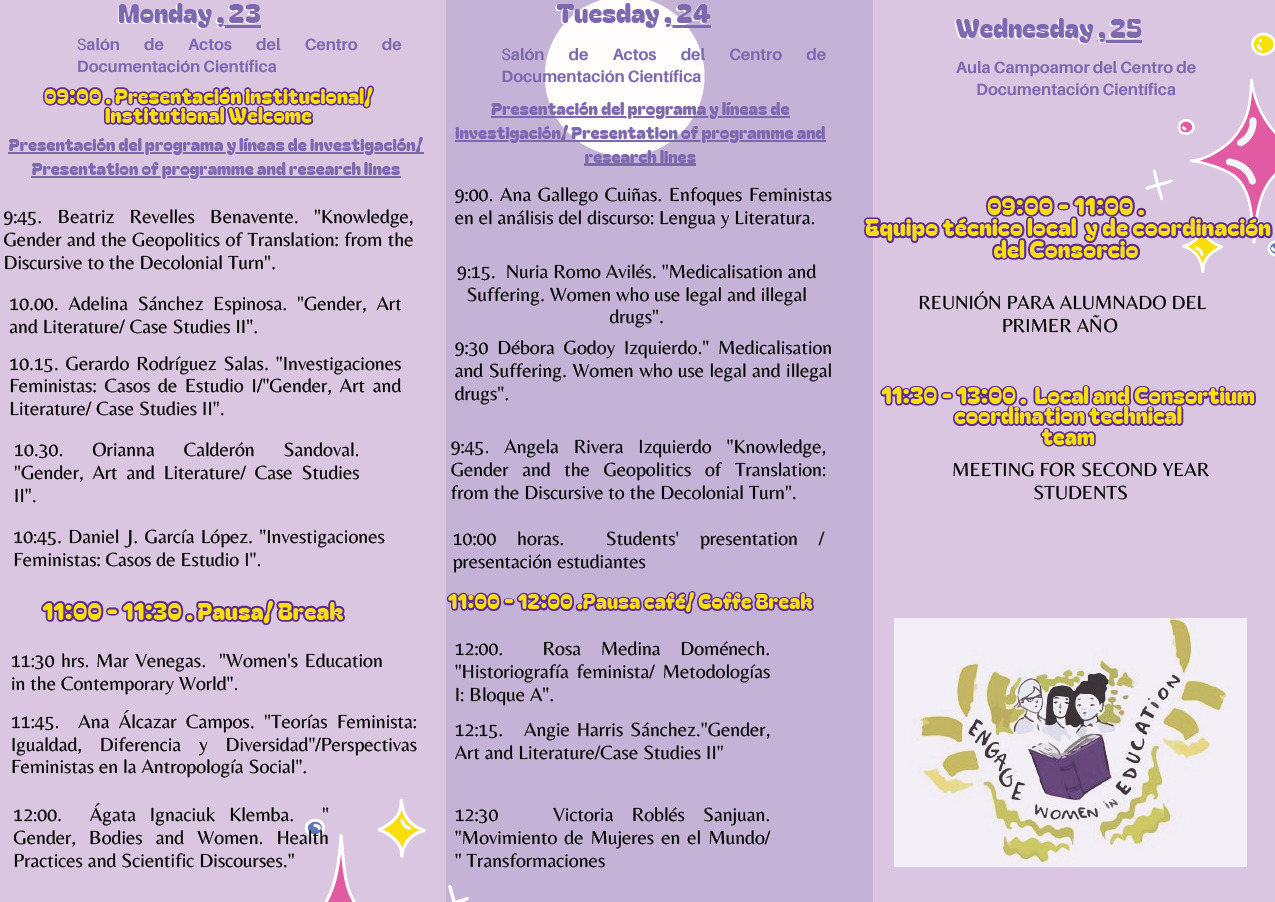
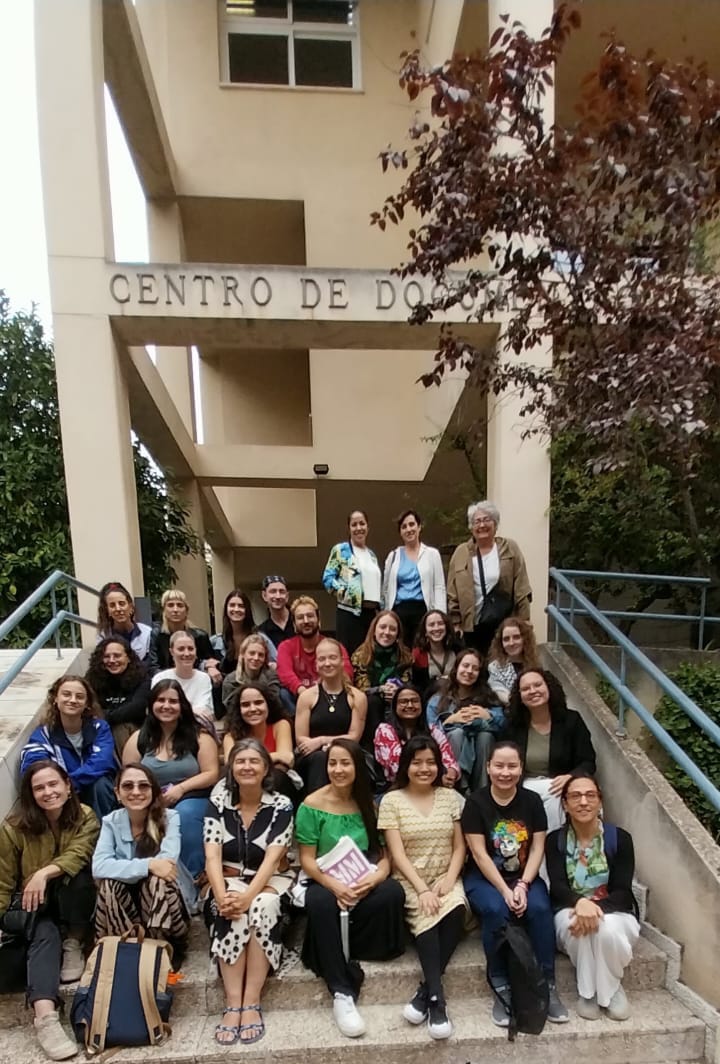
Seminar: "Teaching as Care Work: State and Transfer Policies for Childcare in Spain"
Tabisa Verdejo Valenzuela
Tabisa Arlet Verdejo Valenzuela, from the University of Playa Ancha, Chile, and the University of Málaga, specializes in the feminization of education and care culture. In the seminar held on September 27th, the focus was on childcare in the Spanish context, analyzing the role of the state and related transfer policies.
October 2024
Seminar: "Gender Research Lines in Sub-Saharan Africa: Tanzanian Academia from an Afrocentric Perspective"
University of Dar es Salaam (Tanzania)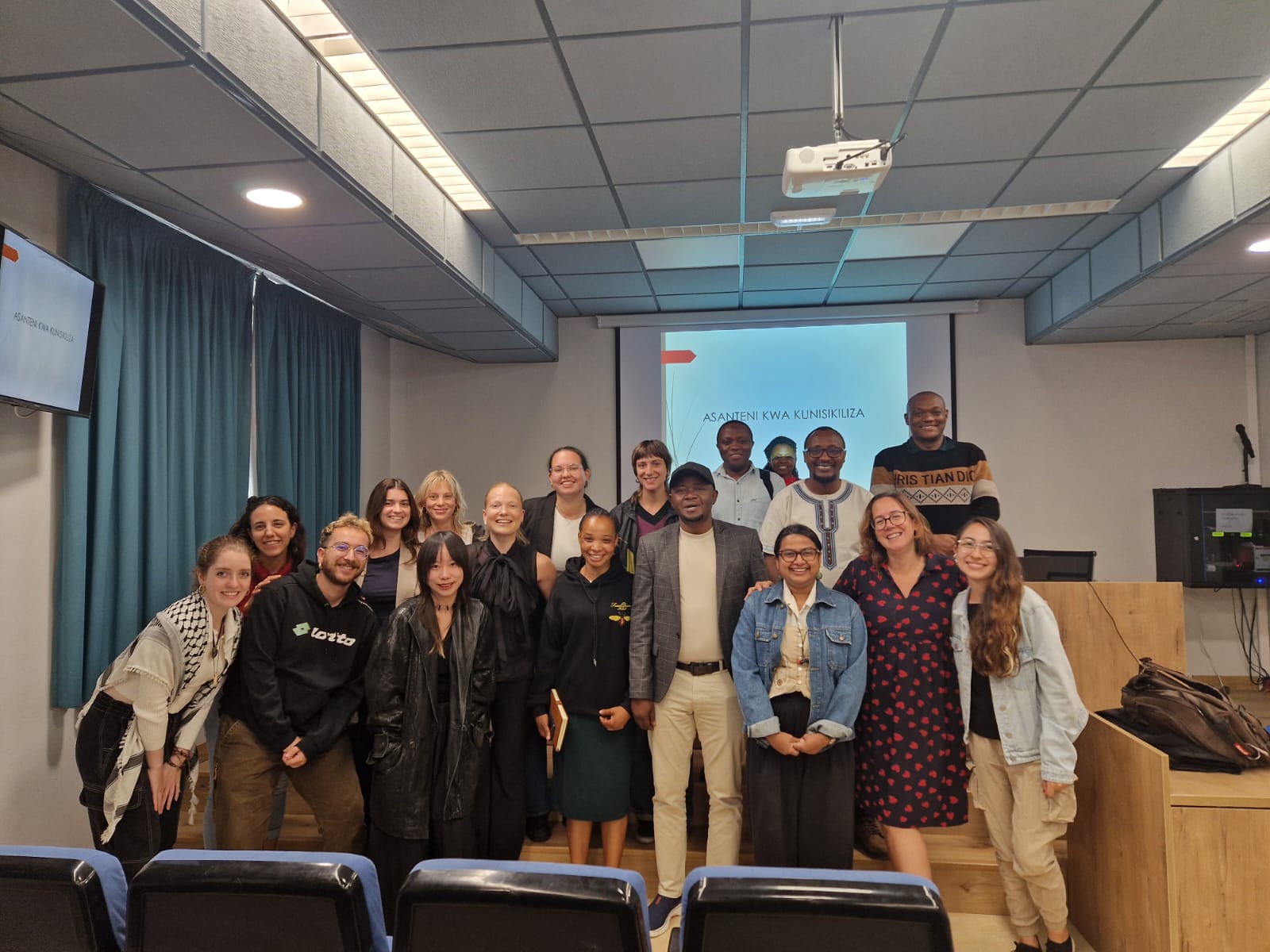
On October 15th, in the Assembly Hall, various researchers from the University of Dar es Salaam in Tanzania presented their scientific interests and productions on gender as a central and/or transversal element. The perspective offered was postcolonial and Afrocentric, also reflected in the proposed case studies. The presentations included Professor Samuel Mhadija from the Department of History, who addressed historical research and its relationship with gender. Professor Jaqueline Mgumia from the Department of Sociology, Anthropology, Social Work, and Psychology presented her works on women and small-scale producers. Professor Mugisha, Director of the Department of Sociology, Anthropology, Social Work, and Psychology, explained current research on people/women-environment relations. Emmanuel Ismael Maphie, a PhD researcher from the Department of Sociology, discussed gender and disabilities from African perspectives. Finally, Professor Titus Mpemba from the Department of Swahili highlighted the importance of local languages for conducting research on the African continent. The seminar concluded with a discussion space, allowing for debate among students, PhD candidates, and professors.
Visiting Scholars
Ángela Rivera Izquierdo. University of Granada (Spain)
Ángela Rivera Izquierdo participated as a guest lecturer on the 7th of October in the course "Geopolitics of Knowledge, Gender and Translation: From the Discursive Turn to the Decolonial Turn" coordinated by Beatriz Revelles Benavente. Ángela Rivera Izquierdo holds a PhD in Literature and Gender Studies from the University of Granada, Spain. She currently works as a postdoctoral researcher (DIGISCREENS). Her research focuses on contemporary literature in English and cultural studies, approached primarily from a gender and affect theory perspective. Additionally, she is a member of the HUM592 research group at the University of Granada and of the R&D projects ResLab and "Democracy, secrecy and dissent in contemporary literature in English". Her research interests include posthumanism and transhumanism, the representation of neoliberal subjectivity, (post)feminism, masculinities and queer identity in literature, metamodern aesthetics-ethics, and the negotiation of democratic values on screen.
Rocío Medina Martín. Universidad Autónoma de Barcelona (Spain)
Rocío Medina Martín, guest lecturer on the 9th, 10th, 11th and 14th of October as part of the course "History of Feminism: Women's Movements in the World", coordinated by Victoria Robles Sanjuán and Teresa Ortega López. She is a postdoctoral researcher in the area of Philosophy of Law at the Universidad Autónoma de Barcelona (UAB). Her interests include: critical theories of human rights, new critical theories of social emancipation, postcolonial and decolonial epistemologies and, in particular, genealogies and proposals of decolonial feminisms. She is closely linked to the historical struggle of the Saharahui people as an activist and academic, having completed her doctoral thesis on Saharahui women in the refugee camps of Tindouf (Algeria), from the perspective of decolonial feminisms.
Acción en Red NGO
On the 15th and 16th of October, the first year students visited Acción en Red, a Spanish NGO that seeks to contribute to social change and that has gender equality as one of its main lines of intervention, as well as combating gender violence. During the visit, the students were able to learn about the work of this NGO and exchange ideas about the projects they support, the issues they deal with and the results obtained in so many years of social action. The visit was part of the subject Movimientos de Mujeres en el Mundo, coordinated by Victoria Robles Sanjuán and Teresa Ortega López.
Olga Fenoll Martínez. University of Lodz (Poland)
Olga Fenoll Martínez participated as a guest lecturer on the 23rd of October in the course "Geopolitics of Knowledge, Gender, and Translation: From the Discursive Turn to the Decolonial Turn," coordinated by Beatriz Revelles Benavente. Furthermore, she taught a class with Marina Casado Guerrero within the subject Feminist Methodologies: Interdisciplinary Methods in Women's Studies coordinated by Milena Rodríguez for the first year. Olga Fenoll Martínez holds a degree in Translation and Interpreting and a Master's in English Literature and Linguistics from the University of Granada. Her work incorporates a queer approach through various intra-actions, including contemporary queer poetry, translation studies, and audiovisual cultures analyzed from a feminist lens of new materialisms. Her current research focuses on the art and writing of transnational, nomadic, and localized women as assemblages in the process of creation. She explores the plastic potential of these works through a diffractive approach guided by a new materialist onto-epistemological perspective and interfered logics. Currently, she is an EUTERPE doctoral candidate at the University of Lodz, Poland.
November 2024
OPEN LECTURE: "Arts of Catastrophe: Art as Politics in Neoliberal Puerto Rico" by Prof. Frances Negrón (Columbia University)
On the morning of the 29th of November, an open lecture titled "Arts of Catastrophe: Art as Politics in Neoliberal Puerto Rico" was held by Prof. Frances Negrón (Columbia University). The seminar took place in Aula Campoamor and was delivered by filmmaker, writer, and professor at Columbia University, Frances Negrón. In her talk, Negrón explored how art can serve as a form of resistance and critique against the neoliberal political and economic structures that have impacted Puerto Rico in recent years. Frances Negrón is renowned for her multidisciplinary work that spans cinema, literature, cultural criticism, and social activism.
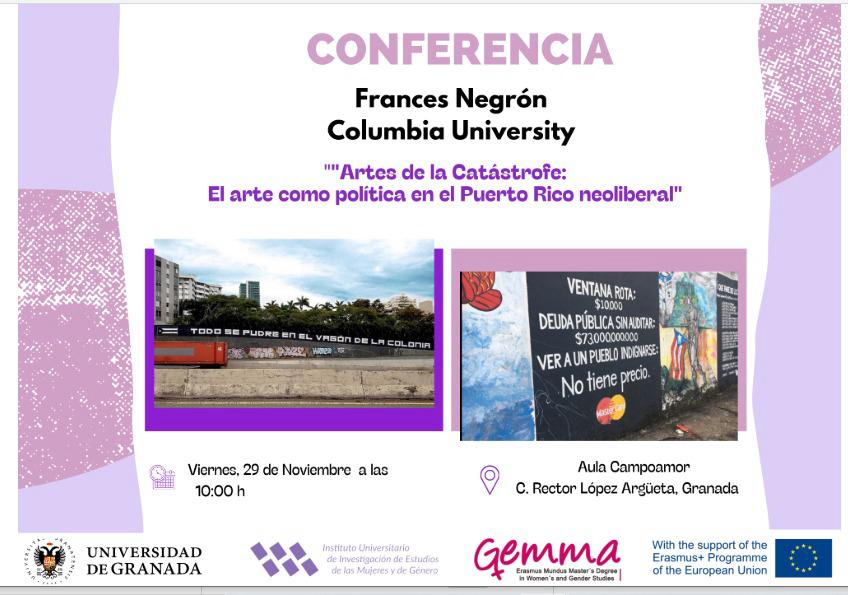
Visiting Scholars
Jesús Martínez Sevilla. GEMMA Voices. University of Jaén (Spain)
Jesús Martínez participated as a guest lecturer and GEMMA alumnus (GEMMA Voices) on November 6th within the course "Feminist Research: Case Studies II", coordinated by Adelina Sánchez and Gerardo Rodríguez Salas. Jesús Martínez Sevilla is a member of the faculty in the Department of Social Anthropology at the University of Jaén. His doctoral research focuses on studying, through ethnographic and feminist methodologies, the gender inequalities that characterize the experience of individuals diagnosed with severe mental disorders. Additionally, he highlights his interest in the philosophy of psychiatry, the implications of feminist epistemology for social science (particularly for ethnographic methodology), the use of digital technologies in research, and the inequalities created around the social organization of care.
Agnes Nasozi Kamya. Makerere University (Uganda)
On November 8th, 9th, 10th, 11th, and 14th, Professor Agnes Nasozi Kamya will participate as a visiting professor in the course "Gender, Culture and Development: Africa", coordinated by Roser Manzanera-Ruiz and Soledad Vieitez-Cerdeño. Agnes Nasozi Kamya is a Ugandan social anthropologist, writer, and flamenco dancer. She holds an MEng in Civil Engineering and an MA and PhD in Social Anthropology. She began flamenco in 2007. In 2011, she moved to Spain to improve her skills. In 2015, she founded the Uganda Flamenco Project. She was a keynote speaker in New York in 2018 and wrote the screenplay for the film "Imani". She is a member of AfricaInEs at the University of Granada and an Affiliate Lecturer at Makerere University.
DIGISCREENS PROJECT
DIGISCREENS, Identities and Democratic Values on European Screens, is an international transdisciplinary project that examines how streaming and films/TV series contribute to transforming social and cultural dynamics in Europe. It is a collaborative project led by Dr. Maud Ceuterick (University of Bergen, Norway), in collaboration with Principal Investigators Dr. Lina Kaminskaitė-Jančorienė (Lithuanian Academy of Music and Theatre, Lithuania), Prof. Maria Jansson (Örebro University, Sweden), and Prof. Adelina Sánchez (University of Granada, Spain). On November 12th, the project was presented to second-year GEMMA Master’s students within the course "Feminist Research: Case Studies II", coordinated by Adelina Sánchez and Gerardo Rodríguez Salas, as well as in "Gender, Art and Literature", also coordinated by the same team alongside Orianna Calderón Sandoval.
Dresda Méndez de la Brena. GEMMA Voices. Women Forward International (Mexico)
Dresda Méndez participated as a guest lecturer and GEMMA alumna (GEMMA Voices) on November 13th, 14th, and 15th within the course "Feminist Research: Case Studies II", coordinated by Adelina Sánchez and Gerardo Rodríguez Salas, as well as in "Gender, Art and Literature", also coordinated by the same team alongside Orianna Calderón Sandoval. Additionally, she participated on November 12th and 14th in the course "Feminist Methodologies: Interdisciplinary Methods in Women's Studies" coordinated by Rosa Medina Doménech for the first year. Dresda is a feminist, activist, and part of Women Forward International. She has worked with various feminist organizations at both national and international levels. Her research interests focus on emotions, material culture, queer/crip theory, new materialisms, affects, art, and films about disability and chronic pain. She authored the thesis Corpomaterialities of Pain: Analysis of Experiences of Women with Fibromyalgia (2021) and co-coordinated the book Researching with GEMMA, Feminist Research Alliances: Affective Convergences (2022).
Orianna Calderón Sandoval. GEMMA Voices. University of Granada (Spain)
Orianna Calderón Sandoval participated as GEMMA Voices on November 20th and 21st within the course "Feminist Research: Case Studies II", coordinated by Adelina Sánchez and Gerardo Rodríguez Salas, as well as in "Gender, Art and Literature", also coordinated by the same team alongside Orianna. Orianna Calderón Sandoval is a postdoctoral researcher at the University of Granada, specializing in feminist documentary cinema and gender studies. She won the 2018-2019 Extraordinary Doctoral Award for her thesis on feminist practices in Spanish and Italian non-fiction cinema, co-supervised between Granada and Bologna. She participated in the GRACE (Horizon 2020) project on gender and cultures of equality in Europe. Currently, she is an assistant professor in the Department of English and German Philology and part of the GEMMA Master’s program. Her analyses of films like No existimos and Serás hombre stand out, exploring gender violence and performativity. She also received the XX National Essay Award 'Carmen de Burgos'.
Dau García Dauder. Rey Juan Carlos University (Spain)
Dau García Dauder was a guest lecturer on November 21st and 28th for the course "Feminist Theories: Equality, Difference, and Diversity", coordinated by Aurora Álvarez Veinguer, Ana Alcázar Campos, Lola Martínez Pozo, and Miguel Lorente. García Dauder has been a Social Psychology professor at Rey Juan Carlos University in Madrid since 2000, currently teaching in the Criminology department. They obtained their Bachelor's degree in Psychology in 1997 and their PhD in Social Psychology in 2003. They have published books such as "Psychology and Feminism: Forgotten History of Women Pioneers in Psychology" (2005) and "Scientific Lies About Women" (2017), the latter co-authored with Eulalia Pérez Sedeño. Additionally, they have created the blog "Lokapedia. Mad Culture and Feminism" with Grecia Guzmán, focusing on feminism and madness.
Ángela Harris. GEMMA Voices. University of Granada (Spain)
Ángela Harris participated as a guest lecturer and GEMMA alumna (GEMMA Voices) on November 22nd and 25th within the course "Feminist Research: Case Studies II", coordinated by Adelina Sánchez and Gerardo Rodríguez Salas, as well as in "Gender, Art and Literature", also coordinated by the same team alongside Orianna Calderón Sandoval. Ángela holds a degree in Art History (University of Granada), a Master’s in Art Therapy (Complutense University), a double Erasmus Mundus GEMMA Master’s, and a double International PhD in Women’s Studies, Discourses and Gender Practices (University of Granada) and Modern Languages, Literatures, and Cultures (University of Bologna). She was a National Research Fellow (FPU) and is currently a UGR-Postdoc and professor in the Department of Archaeology. Recent publications include "Art Therapy, Queer Failure, and Horizontal Learning Experience in Post-Memorial Family Narratives of Students" (co-author), "Beyond Being: Dissident (ificatory) Responses towards a Heritage of Becoming", and "Contesting Power in Public Art Spaces. P(l)aces Liminal, Divergent Methodologies, and Observant Participation in Valor y Cambio".
Esther Mayoko. Tufts-Skidmore University (Spain)
Esther Mayoko, guest lecturer on the 22nd, 25th and 26th of November as part of the course "Feminist Theories: Equality, Difference and Diversity", coordinated by Aurora Álvarez Veinguer, Ana Alcázar Campos, Lorena Valenzuela and Miguel Lorente. She holds a PhD in Philosophy of Science from the University of Santiago de Compostela, is a professor at Tufts-Skidmore University and is part of the R+D project "CSIC Voces múltiples, saberes plurales y tecnologías médicas". Approaching the body as a political category, she has researched the impact of public policies on trans and racialized people. Aside from her academic work, she has never ceased her feminist and sexual dissidence activism, and is currently active in the Conciencia-Afro collective and belongs to the Afrofeminist network Red.Afrofem. We talked about speculative feminism as a form of resistance to the colonial archive.
Frances Negrón, Columbia University (United States)
Frances Negrón-Muntaner was the guest lecturer on November 26th, 27th, and 28th within the course "Feminist Research: Case Studies II", coordinated by Adelina Sánchez and Gerardo Rodríguez Salas, as well as in "Gender, Art and Literature", also coordinated by the same team with Orianna Calderón Sandoval, and an open lecture on November 29th. Frances Negrón-Muntaner is a Puerto Rican filmmaker, writer, and scholar. She holds an M.A. in Visual Anthropology and Fine Arts from Temple University and a Ph.D. in Comparative Literature from Rutgers University. Author of Boricua Pop (2004 CHOICE Award) and editor of Puerto Rican Jam and Sovereign Acts. Notable films include Brincando el charco and War for Guam. Co-founder of NALIP and curator of Columbia’s Latino Arts and Activism Archive. Key honors: Lenfest Award (2012), Frank Bonilla Public Intellectual Award (2019). Directed Columbia’s Center for the Study of Ethnicity and Race (2009–2016). Currently working on Valor y Cambio and an Arthur Schomburg biography.
December 2024
Seminar I: "Effective research strategies in Gender Studies”
Natalia García Caballos
Natalia García Caballos structured three sessions for the second-year GEMMA students, aiming to provide them with key elements for conducting research in Gender Studies. The three sessions were held in Aula Campoamor in English to facilitate comprehension for the second-year students. During the first session, on December 2nd, various research strategies in the field of Gender Studies were explored. The students had the opportunity to explore the tools offered by the University of Granada and discovered the resources available to them thanks to their status as students here. With her experience as a librarian and her background in research, Natalia García Caballos provided practical and useful tools, enabling the students to develop essential skills for their research in this field.
Seminar II: "Boost your research efficiency using Mendeley for Reference Management"
Natalia García Caballos
Following the process started in the previous session, on December 4th, the focus was on reference management tools, starting with general concepts and then moving to practical application. Through practical exercises and discussions, the students developed very useful skills for structuring their master's thesis.
Seminar: “Introduction to the theme of exile of racialized women and the arts as mediators in reconstruction processes in the new urban context”
Luz Elena Luna Monart
On December 3rd and 5th, the Aula Campoamor hosted two seminars on the theme of exile. Luz Elena Luna Monart, professor at the Faculty of Performing Arts at the Departmental Institute of Fine Arts in Santiago de Cali (Colombia), led these sessions. Luna Monart structured the two sessions through a configuration that allowed a deep exploration of the forced displacement processes in Colombia. The exile in Colombia is a complex phenomenon that has affected millions of people, especially women and rural communities, forcing them to abandon their lands and homes, and to rebuild their lives in urban contexts, where the arts play an important role in the processes of reparation and construction of new identities. Throughout the seminars, dialogue and exchange were central elements. GEMMA students actively participated in discussions, where academic perspectives merged with the personal experiences shared by Luna Monart. Reflections on exile, cultural resistance, and the power of the arts as tools for reconstruction were crucial to the sessions. Students who participated in the seminar successfully received a certification of participation.
Visiting Scholars
Paula Pérez Sanz. La Rioja University (Spain)
Paula Pérez was the guest lecturer on December 11th as part of the course "Feminist Metodologías Feministas: Métodos Interdisciplinares en Estudios de las Mujeres II" coordinated by Carmen Gregorio Gil. Paula holds a PhD in Women's Studies, Gender Discourses and Practices and a degree in Sociology and Social Anthropology. She is also an associate lecturer at the University of La Rioja and is part of the research group Sociological Analysis and Social Change. Her research focuses on urban anthropology and the right to the city from a gender perspective and feminist theories.
January 2025
Seminar III: Natalia García Caballos
"AI in Gender Studies: Improve your research and critical thinking"
On January 9th, the Campoamor Classroom hosted the last of three sessions offered by Natalia García Caballos. In this session, GEMMA students were able to learn how to use AI, a current and important topic, in an ethical manner and in line with guidelines provided by the University of Granada. The seminar was structured as a mix of classroom activities and discussion.
Seminar: "Shared Feminist Conversations: Gender, Subjectivity, and Mourning. Feminist Revisions of the Neoliberal and Patriarchal Unconscious"
Nora Levinton Dolman
On January 14th, the Assembly Hall hosted a meeting on gender, subjectivity, and mourning within the framework of shared feminist conversations. The topic was developed by establishing a dialogue between neoliberal policies and patriarchal systems from a revisionist perspective. Nora Levinton Dolman is a psychoanalyst and feminist who has worked at the intersection of psychology and gender, notable for her contributions to understanding female subjectivity and the impact of gender violence.
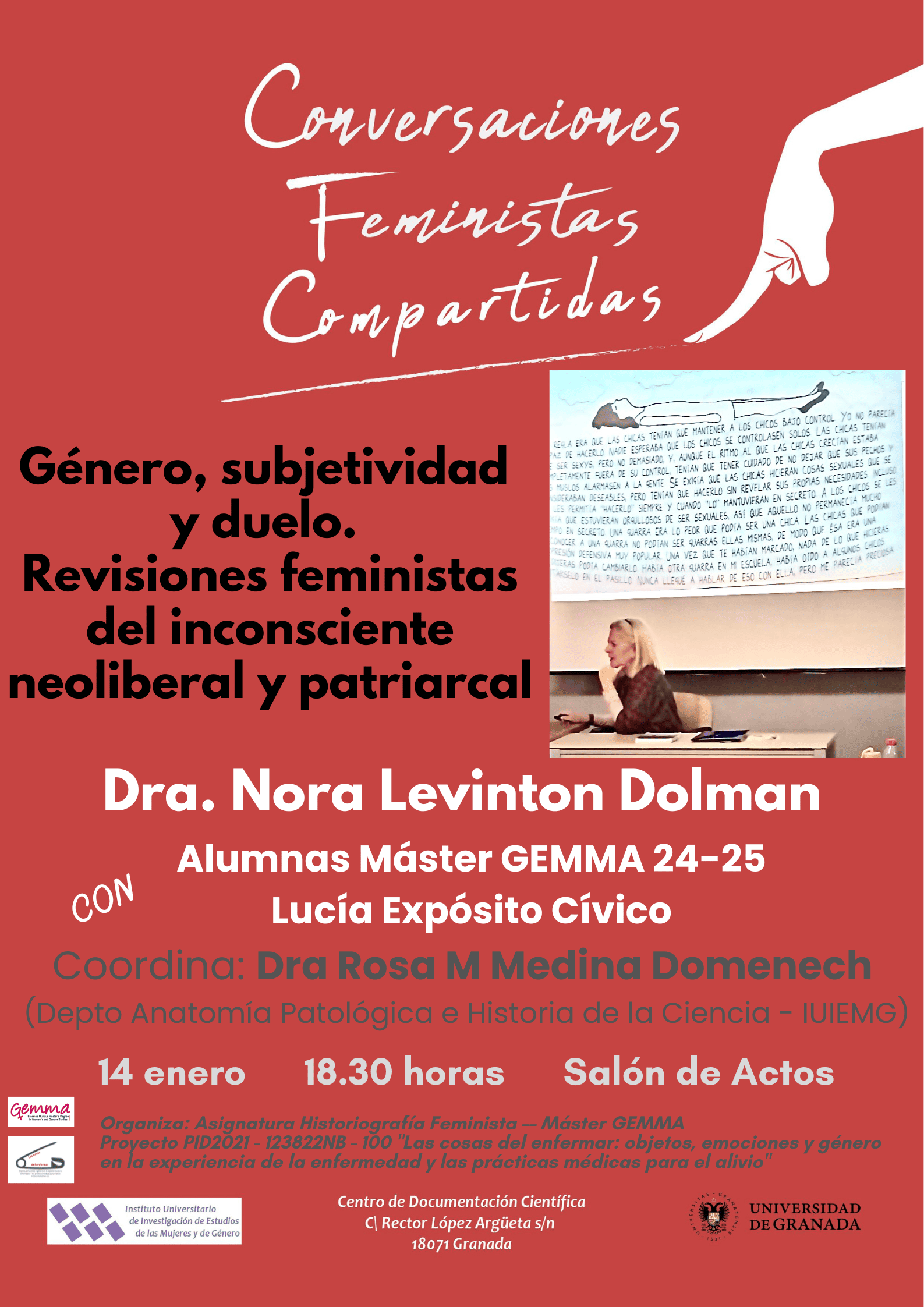
Visiting Scholar
Elena Casado Aparicio. Universidad Complutense de Madrid (Spain)
Elena Casado was the guest lecturer on January 15th, 16th and 17th as part of the subject "Metodologías Feministas: Métodos Interdisciplinares en Estudios de las Mujeres II" coordinated by Carmen Gregorio.
Elena is a professor in the Department of Sociology: Methodology and Theory at the Complutense University of Madrid and a member of the Sociología Ordinaria group. Enthusiastic about teaching, she coordinates the Health and Society project, linked to the subject she teaches in the Faculty of Nursing. Her lines of research revolve around the sociology of communication, gender relations, the sociology of health and new teaching and research methodologies. Feminist commitment, the joy for teaching and an interest in language and the construction of meaning have been three constants in her career.
Zelda Alice Franceschi. Bologna University (Italy)
Zelda Alice was the guest lecturer on January 16th as part of the course "Medicalization and Suffering", coordinated by Nuria Romo Avilés.
Zelda is an Associate Professor at the University of Bologna, where she teaches History of Anthropology, Anthropology of the Americas, and Cultural Anthropology. Since 2004, she has been working in Chaco (Argentina) among wichi communities. Additionally, she studies natives’ autobiographies, the Anthropology of Nutrition, Material Culture, and the Relationship between Writing and Orality, as well as the relationship between indigenous-mission-mecanization. She has also researched the birth and construction of Anthropology, with a focus on the History of American Anthropology.
María Rosón. Univeristy Complutense of Madrid (Spain)
María Rosón participated as a guest professor on January 16-17 as part of the course "History of Feminism: Feminist Historiography", coordinated by Margarita M. Birriel Salcedo, Rosa Medina Doménech, and Alina Danet Danet.
María Rosón is an Assistant Professor in the Department of Art History at the Complutense University of Madrid. She obtained her PhD from the Autonomous University of Madrid and has worked as a researcher at the Reina Sofía Museum and the University of Valencia. Her research focuses on the visual and material culture of 20th century Spain, with special attention to feminist and gender studies. She has curated exhibitions such as "José Ortiz Echagüe" and "Women Under Suspicion". She is the author of the book "Gender, Memory and Visual Culture in Early Francoism" and co-editor of several monographs.
María Jesús López Sánchez-Vizcaíno, University of Córdoba (Spain)
María Jesús López Sánchez-Vizcaíno was the guest lecturer on January 20th and 21st within the course "Feminist Research: Case Studies II", coordinated by Adelina Sánchez and Gerardo Rodríguez Salas, as well as in "Gender, Art and Literature", also coordinated by the same team alongside Orianna Calderón Sandoval.
María Jesús is a senior lecturer in the Department of English and German Philology at the University of Córdoba. She has been a visiting researcher at the Universities of Nottingham, York, Duke, New South Wales (Sydney), and Cape Town (South Africa), as well as at the School of Oriental and African Studies (London) and the National English Literary Museum (Grahamstown, South Africa). Her research areas include: postcolonial literature in English, particularly South African literature; British modernism; community theories; and the relationship between ethics and literature.
Paloma González Marcén. Universidad Autónoma de Barcelona (Spain)
Paloma González Marcén was the guest lecturer on January 28th, 29th and 30th as part of the "Género y Arqueología" course coordinated by Margarita Sánchez.
Paloma is an archaeologist and Senior Lecturer in the Department of Prehistory at the Autonomous University of Barcelona. She is also co-director of the Centre d'Estudis del Patrimoni Arqueològic de la Prehistòria (CEPAP) attached to the UAB. Her research has focused on public archaeology and the theoretical and methodological aspects of archaeological research, especially on the archaeology of women and gender.
Marina Casado Guerrero. Central European University (Austria) and Olga Fenoll Martínez. University of Lodz (Poland)
On January 30th, Marina Casado Guerrero gave a class with Olga Fenoll Martínez as part of the course "Feminist Methodologies: Interdisciplinary Methods in Women's Studies" coordinated by Milena Rodríguez.
Marina Casado Guerrero is a PhD candidate at CEU Vienna. She is interested in different artistic forms, especially in poetry, body performances, and dance, as well as in their potential intersections. She holds a BA in English Literature and Linguistics from the University of Granada and is a former GEMMA student. She is currently working on the EUTERPE doctoral project.
María Jesús Santesmases. Spanish National Research Council (Spain)
María Jesús Santesmases was the guest lecturer on January 31st as part of the course "Gender, Bodies and Women" coordinated by Agata Ignaciuk.
María Jesús holds a PhD in Chemistry (University of Madrid) and is a Research Professor of the Spanish National Research Council at the Institute of Philosophy. Her research focuses on the history of biomedical sciences, science policy and gender and women in biomedicine. Her research projects include: 'How did the Antibiotic Pipeline Run Dry?', Ontologías híbridas: objetos científicos y culturas visuales entre la industria, la clínica y el laboratorio’ and ‘Circulación y reproducción en la Biología contemporánea: epistemología, experiencias y materiales’.
February 2025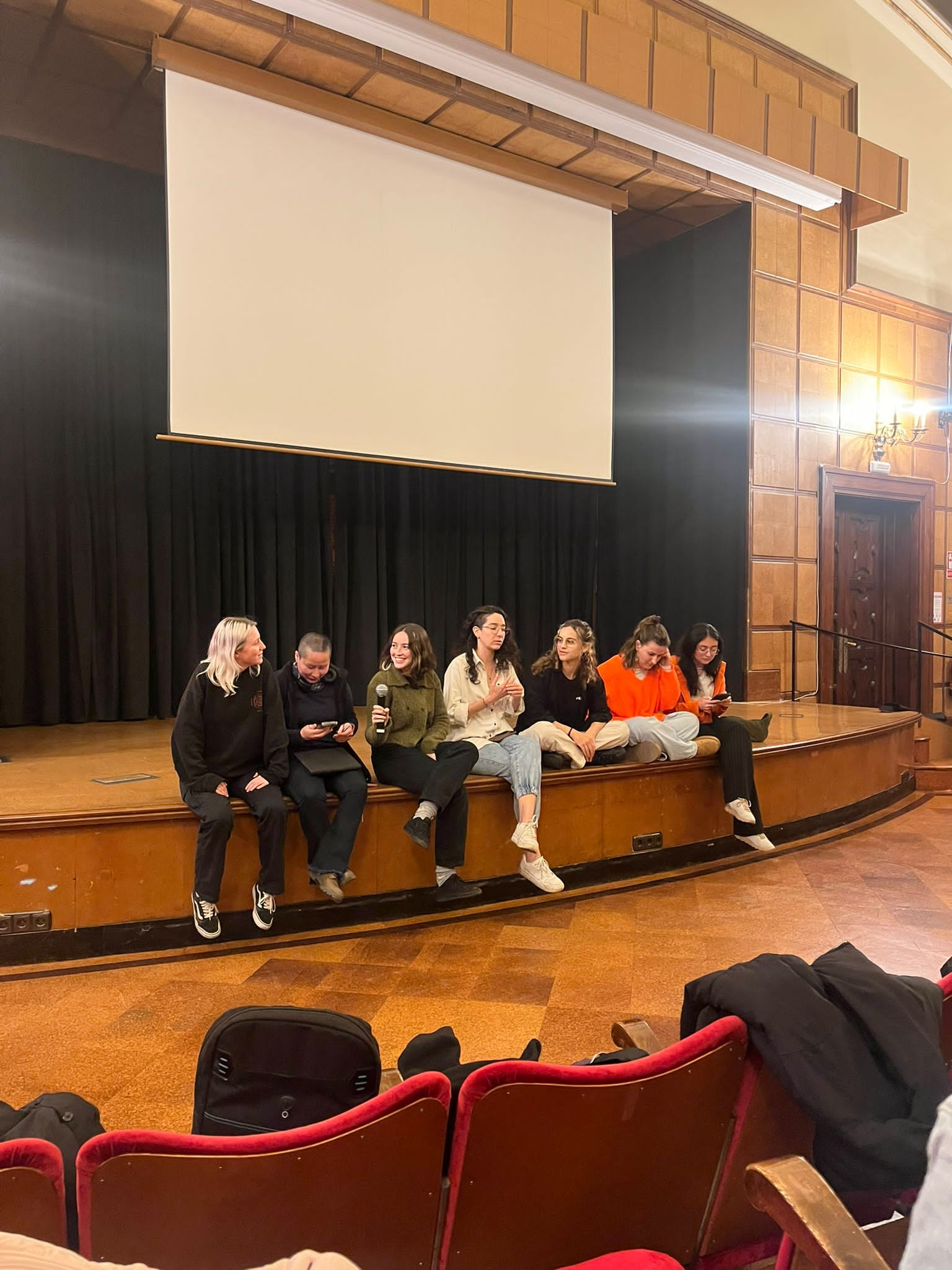
6th "Dissident Masculinities" Film Cycle
Between February and April 2025, first-year GEMMA students participated in organizing the 6th "Dissident Masculinities" Film Cycle held at the V Centenario Space of the University of Granada. Organized by the Women's and Gender Studies Institute, the UGR Equality Unit, the GEMMA Erasmus Mundus Master's Degree in Women's and Gender Studies, the Men for Equality, Equity and Diversity Network of Granada, AHIGE Andalucía (Association of Men for Gender Equality), in collaboration with the Vice-Rectorate for Student Services and Campus Life.
The cycle aims to screen fiction films and documentaries that explore issues concerning gender, its representation in the audiovisual world, and more specifically, that show possible points of departure from hegemonic masculinities. The films screened were, in order: "My Empty Self" (Adrián Silvestre, 2022), "Stop Telling Lies" (Oliver Peyon, 2022), and "The Rider" (Chloé Zhao, 2017). The students facilitated the screenings, presenting and introducing the films, and subsequently proposing questions to open a space for debate and dialogue on the themes addressed by each film.
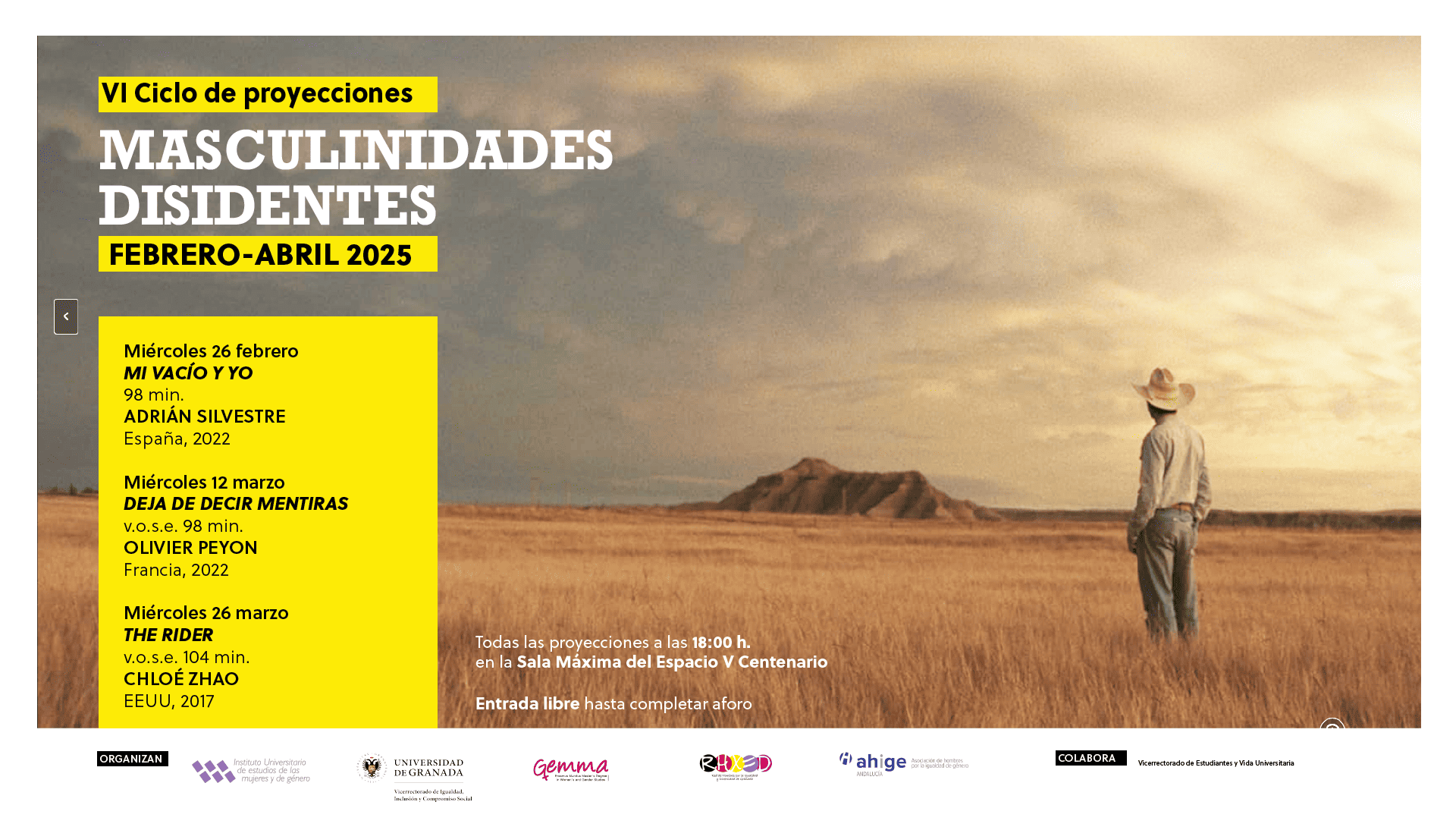
Visiting Scholars
Agnieszka Kościańska. University of Warsaw (Poland)
Agnieszka Kościańska was the guest lecturer on February 7th as part of the course "Gender, bodies and women" coordinated by Agata Ignaciuk.
Agnieszka is an Associate Professor at the Department of Ethnology and Cultural Anthropology at the University of Warsaw. She has also been a visiting professor at the Oxford School of Global and Area Studies in 2021 and 2022. Her research interests include anthropology of gender and sexuality, contemporary religiosity, religious conversion, gender studies, history of sexuality, sexual violence, cultural conditions of sex education, discrimination and racism.
Sam Fernández, Granada University (Spain)
Sam Fernández was the invited lecturer on February 14 as part of the course "Gender, bodies and women" coordinated by Agata Ignaciuk.
Sam Fernández is a transfeminist researcher and activist. They studied biology and specialized in medical anthropology and social research. They work as a consultant on feminist LGBTIQ+ public policies and are a member of the Medical Anthropology Research Center at the Universitat Rovira i Virgili. Sam participates in projects on gender, emotions, and subjectivity in healthcare, especially on intersex issues. They have also completed training in therapies such as humanistic art therapy and feminist psychotherapy. Sam Fernández-Garrido earned their PhD from the University of Granada in 2021.
Cristina Gámez, University of Córdoba (Spain)
Cristina Gámez was the guest lecturer on February 18th and 19th within the course "Feminist Research: Case Studies II", coordinated by Adelina Sánchez and Gerardo Rodríguez Salas, as well as in "Gender, Art and Literature", also coordinated by the same team alongside Orianna Calderón Sandoval.
Cristina is a Senior Lecturer in the Department of English and German Philology at the University of Cordoba, where she teaches courses on Literature and Cultures in the English language at undergraduate and postgraduate level. She belongs to the SICA Research Group GRACO: Studies in Literature, Criticism and Culture and is a researcher on the project "Interfaces: Representaciones de la Vulnerabilidad Humana en la Cuarta Revolución Industrial", as well as co-IP in the project "Representaciones de la vulnerabilidad como elemento de exclusión o cohesión social: precariedad y discapacidad en los discursos de ficción en lengua inglesa (s. XX y XXI)". Her research interests include: English language literature, cultural studies, disability studies and the fourth industrial revolution.
Belén Agrela Romero. Jaén University (Spain)
Belén Agrela was the guest lecturer on February 18th and 19th as part of the "Trabajo Social" course coordinated by Amalia Morales.
Belén is a lecturer in Social Work at the University of Jaén. Expert in gender, migration and social intervention policies. Coordinator of the Doctorate in Migration Studies at the University of Jaén and member of the Seminar on Women, Science and Society. Moreover, she participates in different master's degrees at several Andalusian universities and she has research experience as a visiting professor at Canadian, Danish, US and UK universities. She has also been director of different international and national projects.
Inmaculada Antolínez Domínguez. Cádiz University (Spain)
Inmaculada Antolínez Domínguez was the guest lecturer on February 21st as part of the "Trabajo Social" course coordinated by Amalia Morales.
Inmaculada Antolínez Domínguez is an Associate Professor in the Department of Labor Law and Social Security at the University of Cádiz. She earned her PhD from the University Pablo de Olavide and specializes in Social Work and Social Services. Her research focuses on interculturality and migration.
Marek Wojtaszek, University of Lodz (Poland)
Marek Wojtaszek was the guest lecturer on February 24th and 25th within the course "Feminist Research: Case Studies II", coordinated by Adelina Sánchez and Gerardo Rodríguez Salas.
Marek is Assistant Professor at the Faculty of International and Political Studies at the University of Lodz, Poland; currently affiliated with the Department of Transatlantic and Media Studies and Women’s Studies Centre. His areas of research are gender, science, technology and environment.
April 2025
1st GEMMA Employer-bility Event
The two-day 1st GEMMA Employer-bility Event was held on April 7-8 explored the professional futures of first- and second-year GEMMA students in sectors such as academia, public institutions, NGOs, and the private sector. Hosted across three venues at the University of Granada – the Centro de Documentación Científica, the gardens of Colegio de Isabel la Católica, and the Faculty of Political Science – as well as online, the event combined theoretical discussions with practical tools.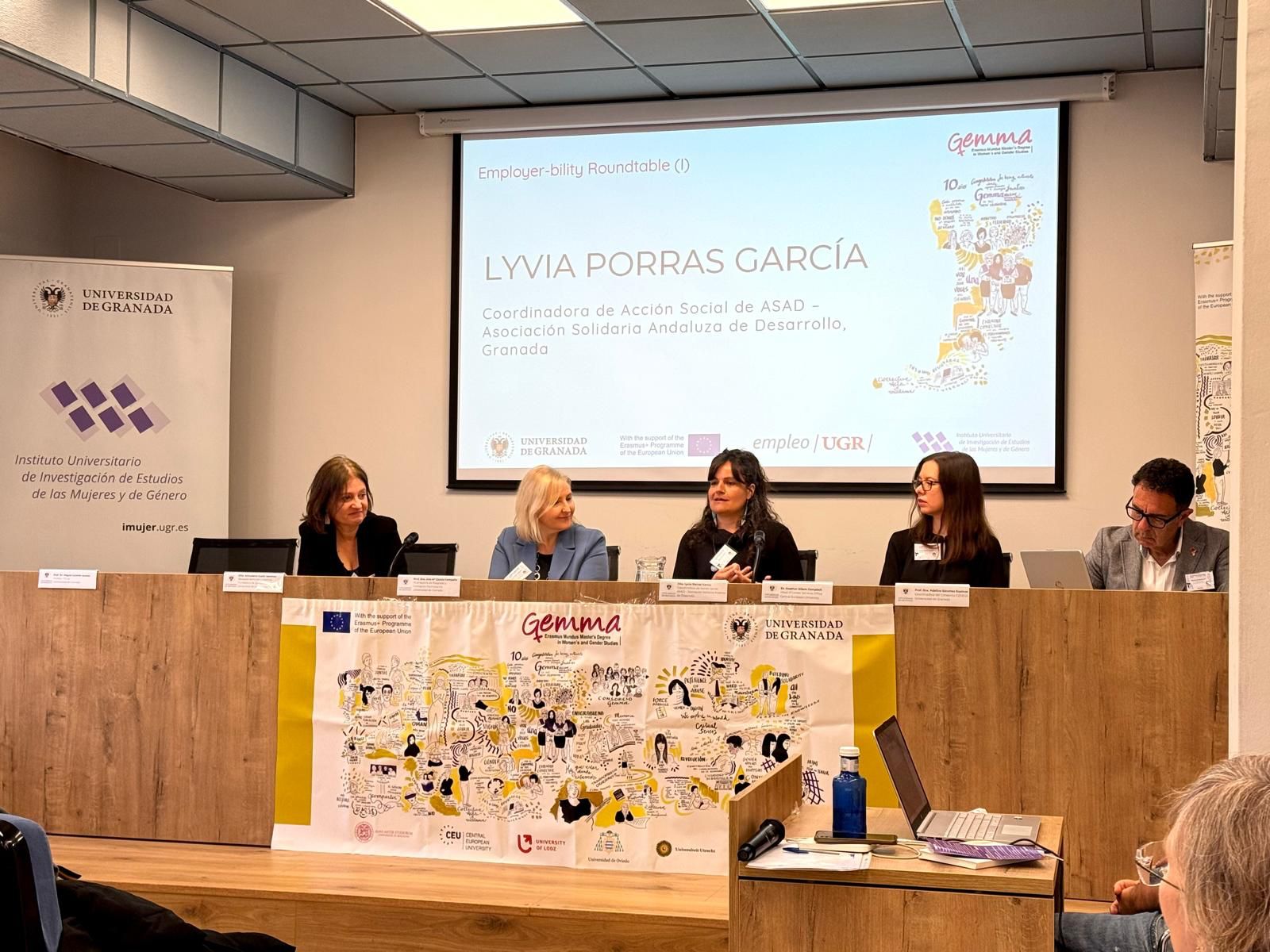
The inaugural session at the Salón de Actos "Francisco Muñoz" featured institutional addresses by Mar Venegas Medina (Vice-Rector for Equality, Inclusion, and Social Engagement), Ana María García Campaña (Vice-Rector for Postgraduate Studies and Continuing Education), and Ana Alcázar Campos (Director of the Institute for Women’s and Gender Studies), moderated by Adelina Sánchez Espinosa (GEMMA Consortium Coordinator). A first roundtable on employability challenges, moderated by Adelina Sánchez, included experts such as Miguel Lorente (former Government Delegate for Gender Violence), Heather Alison Campbell (CEU Career Services), Almudena Cueto Sánchez (feminist lawyer), and representatives from the public sector Rita Monticelli (GEMMA Academic Coordinator, UNIBO) and Lyvia Porras García (ASAD Coordinator). The second roundtable, led by Ágata Ignaciuk, highlighted transnational experiences of GEMMA alumni: Zairong Xiang (academia), María Encarnación Quesada Herrera (public sector), Dresda E. Méndez de la Brena, and Roghayeh Rezaei (NGOs), with in-person participation from Olga Fenoll Martínez (academia).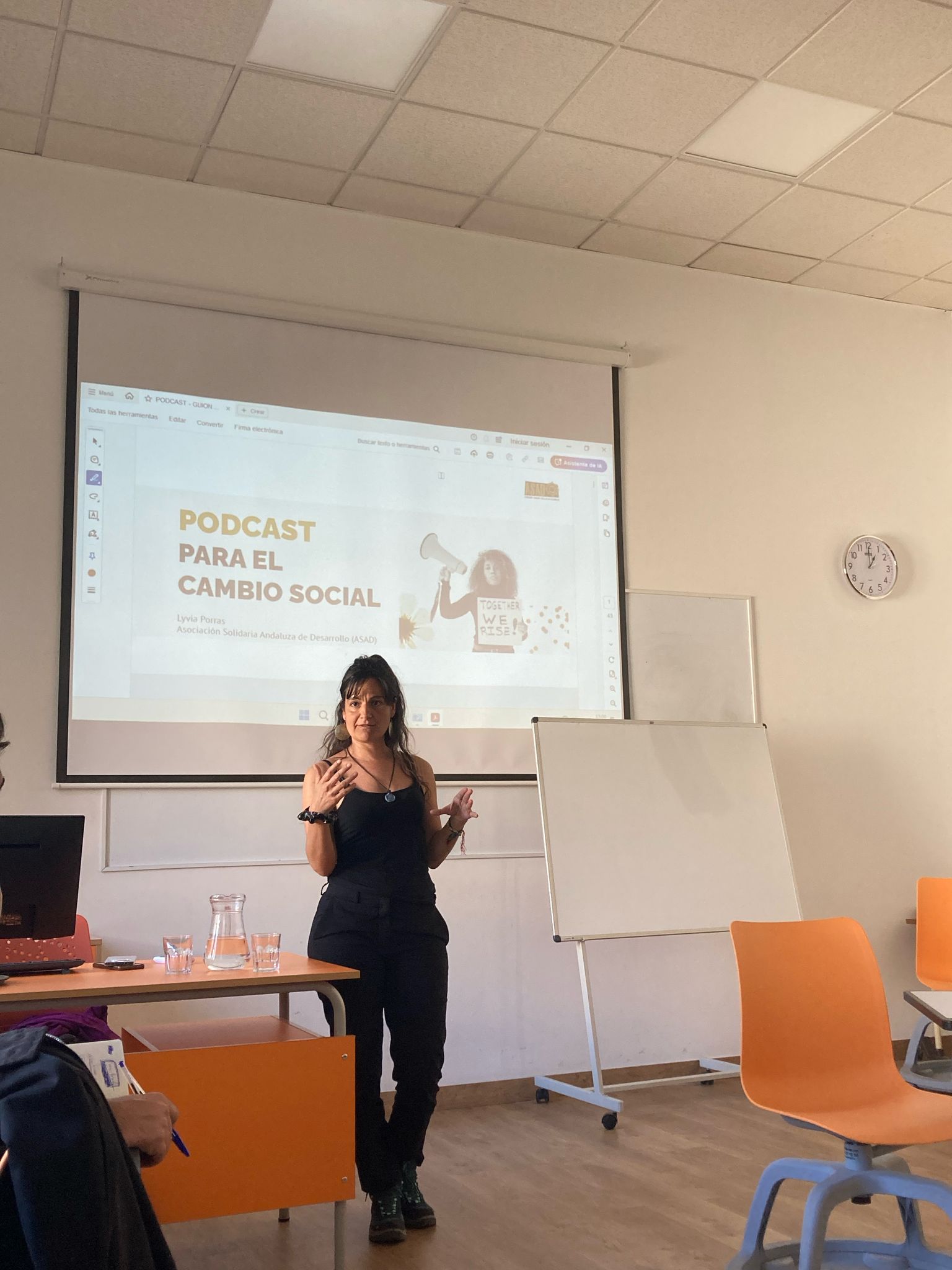
The second day focused on employer-bility workshops at the Centro de Documentación Científica and Faculty of Political Sciences. Rosa Castilla Ríos, a career counseling technician at UGR's Employment Office, led a session on job search tools and resources. Sandra Camps Ocaña, a renowned journalist and social issues expert, discussed personal branding strategies. The final workshop covered podcast creation as a professional tool, led by Lyvia Porras García, coordinator of social action at ASAD, and Beatriz Merchán, intern at ASAD. The sessions combined practical skills for labor market integration, blending traditional and digital approaches.
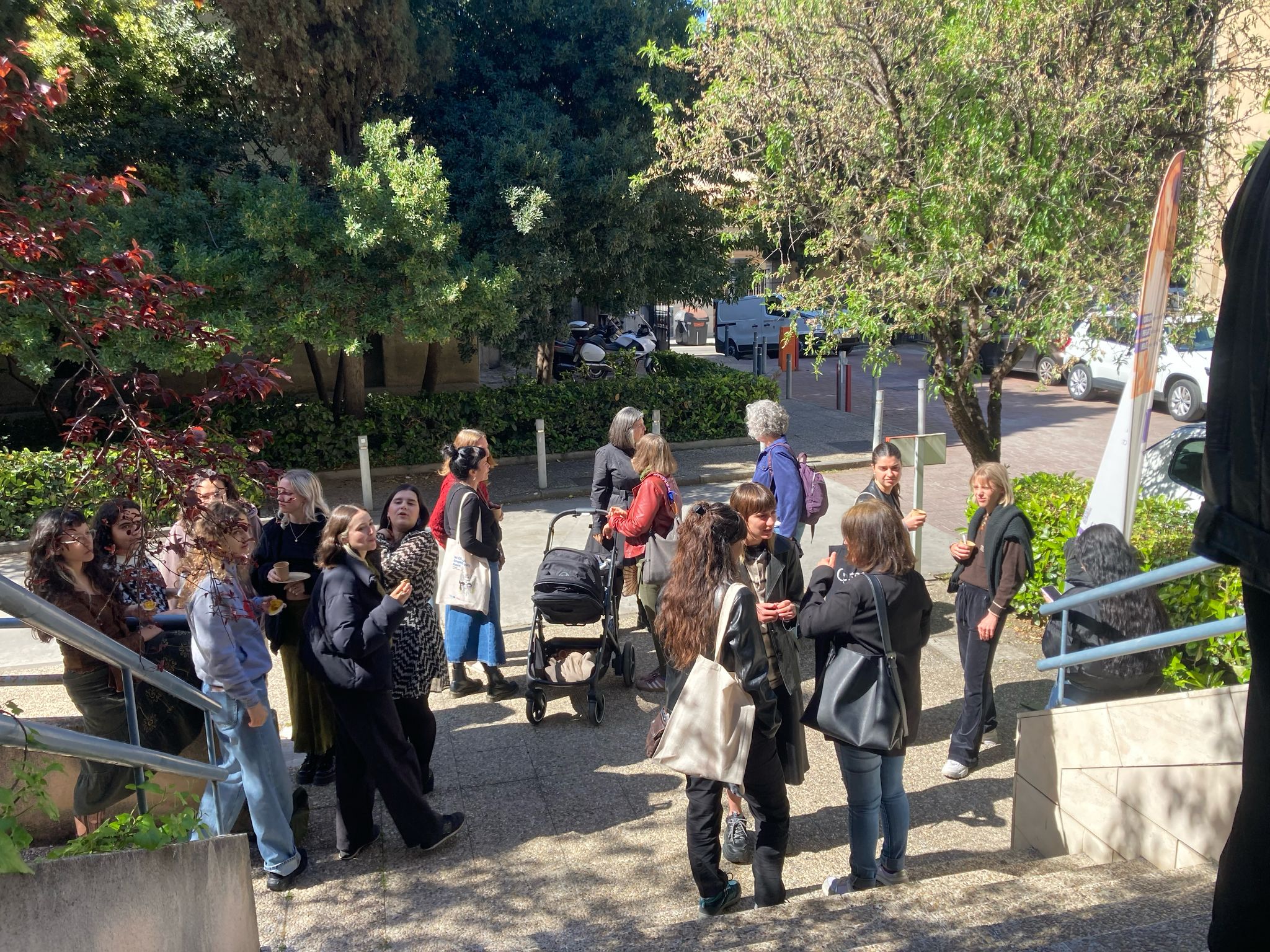
Visiting Scholars
Alba Sierra Rodríguez. Universidad de Extremadura (Spain)
Alba Sierra Rodríguez was the guest lecturer on 10 and 11 April as part of the subject "Trasnformaciones Socio-educativas en el sigle XX en España", coordinated by Victoria Robles.
Alba is a contracted PhD holder in the area of Theory and History of Education in the Department of Educational Sciences at UNEX. She began her teaching and research career at the University of Granada, where she completed her PhD in Women's Studies, Discourses and Gender Practices thanks to one of the prestigious pre-doctoral grants from the Fundación la Caixa (2017-2020). Since 2020 she has been working at the University of Extremadura where she is part of the research group "EduTransforma-T", while she continues working with the research group "OTRAS Perspectivas Feministas en la Investigación Social" at the UGR. Alba has three main lines of research within feminist and gender studies: 1) migration and human trafficking; b) socio-educational action; 3) care, with special attention to university students and the social intervention sector.
May 2025
Visiting Scholars
Marta Ortiz Canseco. Autónoma University of Madrid (Spain)
Marta Ortíz was the guest lecturer on the 29th of May as part of the course "Enfoques Feministas en el Análisis del Discurso" coordinated by Ana Gallego.
Marta is a lecturer in the area of Spanish-American Literature at the Universidad Autónoma de Madrid. Previously, she has worked as Associate Professor at the University of Alcalá and as Adjunct Professor at the International University of La Rioja. She has been the coordinator of the Official Master's Degree in Advanced Studies in Spanish and Latin American Literature at the University of Barcelona. Moreover, between 2007 and 2017 she carried out research stays in prestigious foreign centers (Lima, Paris, London, Berlin).
María José Alonso Vidal. Universidad de Granada (Spain)
María José Alonso was the guest lecturer on the 7th and the 8th of May as part of the course "Perspectivas Feministas en Antropología Social" coordinated by Carmen Gregorio, María Espinosa and Ana Alcázar.
María José is a professor in the Department of Social Work and Social Services at the University of Granada. She has a PhD in Anthropology and Social Work, her thesis was entitled: "¿No irá a hacer una tesis sobre sus amigas?". Relaciones de género en las parejas de lesbianas (2018). She is also part of the Research Group "Others", Feminist Perspectives in Social Research. Her lines of research include: feminist and decolonial epistemologies; feminist ethnography; feminist, queer, lgtb and transfeminist activisms and mobilisations; social organization of care and life support; and feminist ecology.
María Victoria Fernández Sánchez. Universidad de Granada (Spain)
María Victoria Fernández was the guest lecturer on the 7th and the 8th of May as part of the course "Perspectivas Feministas en Antropología Social" coordinated by Carmen Gregorio, María Espinosa and Ana Alcázar.
She recently presented her thesis, completing her PhD in Women's Studies, Discourses and Gender Practices at the University of Granada. Moreover, she is a member of the Research Group “Otras”. Perspectivas Feministas en Investigación Social at the University of Granada, where she is involved in the Depathologisation of affective-sexual, bodily and gender diversity line of investigation.
June 2025
Seminar: “Shared Feminist Conversations: 19th-Century Feminist Narrative and the #metoo Movement"
Julia Chang
The event was held on June 5th at 12:00 PM in the Salón de Actos at the Centro de Documentación Científica, University of Granada. The activity focused on the relationship between 19th-century feminist narrative and the #metoo movement. The main speaker was Dr. Julia Chang from the Department of Romance Studies at Cornell University, with participation from Dr. Ángela Rivera Izquierdo and Dr. Adelina Sánchez Espinosa, both from the Department of English and German Philology (IUIEMG). Organized as part of the GEMMA Master’s program, the event provided a space for dialogue and reflection on the connections between historical and current feminist struggles, and it was open to the interested public.
